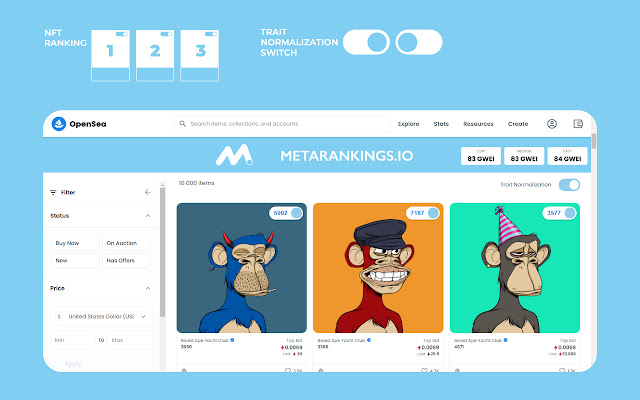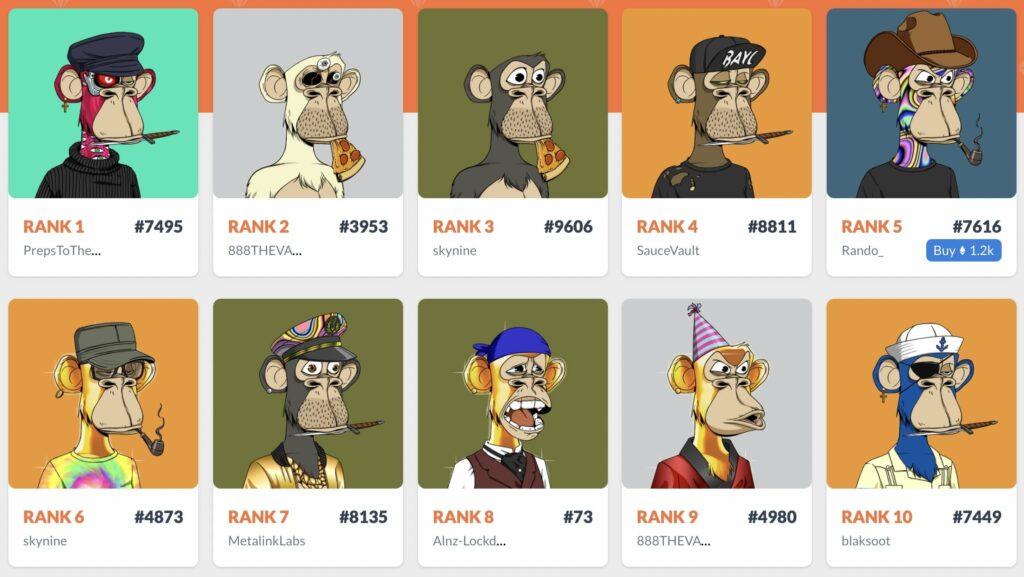NFTs have become popular in the art world due to the perception of their cultural and artistic significance. Rarity is a key factor that determines an NFT’s value as a unique artifact.

A one-of-a-kind nonfungible token that possesses significant cultural or historical value is highly coveted and considered a rare item by collectors. However, the importance of rarity goes beyond just the cultural significance of an NFT.
NFT rarity is important because it directly affects the market worth and appeal of the NFT. The rarity of a nonfungible token can significantly influence its resale value and make it more attractive to collectors. Therefore, NFT collectors frequently seek out unusual and distinctive tokens to add to their collections, increasing the demand for rare NFTs.
While rarity is a significant factor in determining an NFT’s value, it’s important to remember that it’s not the only one. Other elements that may affect the value and appeal of nonfungible tokens include the quality of the artwork, the reputation of the artist, and the cultural or historical relevance of the piece.
It’s essential to understand the concept of NFT rarity, what determines it, and how to calculate NFT rarity rankings. This article will delve deeper into these topics, providing readers with a comprehensive understanding of the importance of rarity in the NFT market.
NFT rarity, explained

NFT rarity is a crucial aspect of non-fungible tokens. It refers to the uniqueness or scarcity of a particular NFT within a collection. The rarity of a non-fungible token is determined by a combination of factors such as the overall number of non-fungible tokens in a collection, the number of copies of a certain non-fungible token in a collection, and the unique qualities or traits of a particular NFT.
For instance, a collection could contain a small total number of NFTs, which can increase the rarity of each non-fungible token in a given collection. However, some collections might have a lot of NFTs, but a specific non-fungible token might be uncommon because it has distinctive qualities, such as a particular color scheme, animation or sound effect. Thus, the rarity of an NFT is not just about its quantity but also the quality of its distinct characteristics.
The rarity of NFTs is highly valued in the NFT market. Due to their increased value and demand from collectors, the price of rare NFTs may rise on NFT marketplaces. It is worth noting that some NFT projects have even created algorithms to figure out the rarity of specific NFTs within a collection. These algorithms can provide buyers and sellers with more knowledge when figuring out the worth of an NFT.
The rarity of an NFT is determined by various factors, and it is vital to consider these factors when assessing the value of an NFT. Rarity can make a significant impact on the price of NFT collectibles, and it is essential to understand the unique characteristics of an NFT to determine its rarity and overall worth.
What is an NFT rarity checker?

An NFT rarity checker is a crucial tool or service that allows users to determine the rarity of a nonfungible token. These tokens often base their value on their scarcity, rarity, and uniqueness. There are a variety of factors that determine the rarity of an NFT, including its properties, metadata, and characteristics. An NFT rarity checker evaluates these factors to determine the rarity of the token.
In general, an NFT rarity checker evaluates the visual and other properties of the nonfungible token, such as its color scheme, pixel density, and other distinguishing features. Additionally, the checker may assess the demand for a certain nonfungible token or the quantity of copies of that NFT that are currently on the blockchain.
To determine the rarity of a nonfungible token, an NFT rarity calculator may follow these steps:
- Identify the rarity: The calculator must first determine the precise NFT that is being assessed. This may involve entering the token ID for the nonfungible token or other identifying information.
- Collect data: Once the calculator has identified the NFT, it must then gather information about the token, such as its characteristics, sales performance, and blockchain data.
- Analyze attributes: The calculator may evaluate the NFT’s visual and other properties, including its pixel density and other distinguishing features.
- Assess rarity: Based on the information gathered and the examination of the nonfungible token’s characteristics, the calculator can then utilize algorithms to determine the NFT’s rarity. The NFT may be compared to other nonfungible tokens in the same collection, and sales information and market trends may be examined.
- Provide results: The calculator also offers a numerical evaluation of the NFT’s rarity, which is frequently presented as a score or rating. Buyers and sellers can use this information to estimate the NFT’s value.
The rarity and value of an NFT can also be influenced by other factors, such as the present market conditions and buyer and seller sentiments, so it is crucial to keep in mind that these calculators are not ideal. Despite this, NFT rarity checkers are a valuable tool for anyone looking to assess the rarity and potential value of a nonfungible token.
How do you determine NFT rarity?
Determining the rarity of nonfungible tokens can be a complex process that involves analyzing a variety of factors. One of the primary indicators of an NFT’s uniqueness is its scarcity. This means that nonfungible tokens that have a low number of copies on the blockchain are more likely to be rare and valuable. By counting the copies of a specific NFT on the blockchain, it is possible to estimate its rarity.
In addition to scarcity, there are several other characteristics that can contribute to the rarity of an NFT. For example, an NFT might be unique due to its distinctive color scheme, an unusual combination of attributes, or a specific theme or subject matter. These characteristics can be compared to those of other nonfungible tokens in the same category to determine the rarity of an NFT.
Popularity and demand can also have an impact on the rarity of an NFT. Nonfungible tokens that have a high demand are more likely to be rare and expensive. This can be determined by analyzing sales information, social media mentions, and other indicators of popularity.
The history or provenance of an NFT may also affect its rarity. For instance, a nonfungible token that has a special past, such as having once been owned by a celebrity or being featured in a well-known meme, may be rarer and more expensive than other NFTs.
There are many factors to consider when evaluating the rarity of nonfungible tokens. By examining these factors, it is possible to gain a better understanding of the value and uniqueness of a specific NFT.
How are NFT rarity rankings calculated?
When it comes to generating nonfungible token rarity rankings, there are various approaches that can be taken, depending on the particular NFT collectibles, the number of editions or copies that exist within that collection, and the demand for that specific NFT within the marketplace.
Typically, the rarity score is determined by summing up numerical values assigned to each quality or trait. However, the formula may change depending on the NFT platform or market. Some platforms may also use external data sources or machine learning algorithms to calculate rarity scores, such as Rarity.tools and Nansen, which employ algorithms to examine the characteristics and properties of each NFT in a collection.
Here are several common techniques used to determine NFT rarity rankings:
Algorithmic scoring: One method for determining NFT rarity rankings is to use an algorithmic scoring system that rates each nonfungible token by considering a number of criteria, including rarity, qualities, popularity, and provenance. Metrics like these can be used to rank the rarity of NFTs.
Comparative analysis: In this approach, each NFT is compared to other nonfungible tokens from the same collection or category. This analysis can provide a qualitative rating of each NFT’s rarity by taking into account variables such as scarcity, qualities, sales history, and market trends.
Data analysis: Sales data or social media mentions can also be used to determine nonfungible token rarity rankings. This type of analysis can show which NFTs are the most well-liked and in-demand, and it can be used to rank the rarest and most expensive nonfungible tokens.
Community feedback: The opinions of NFT collectors, creators, and specialists can also have an impact on the rarity rankings of nonfungible tokens. The rarest and most expensive nonfungible tokens in a certain category or collection can be ranked by aggregating these ratings.
In conclusion, while the process of determining NFT rarity rankings may vary, the goal is the same: to identify the most unique and desirable nonfungible tokens in the market. As a result, while a high rarity score might be a reliable indicator of a nonfungible token’s value and originality, it is essential to take other aspects into account when determining the value of a nonfungible token.
DISCLAIMER: The Information on this website is provided as general market commentary and does not constitute investment advice. We encourage you to do your own research before investing.
Join us to keep track of news: https://linktr.ee/coincu
Annie
Coincu News














